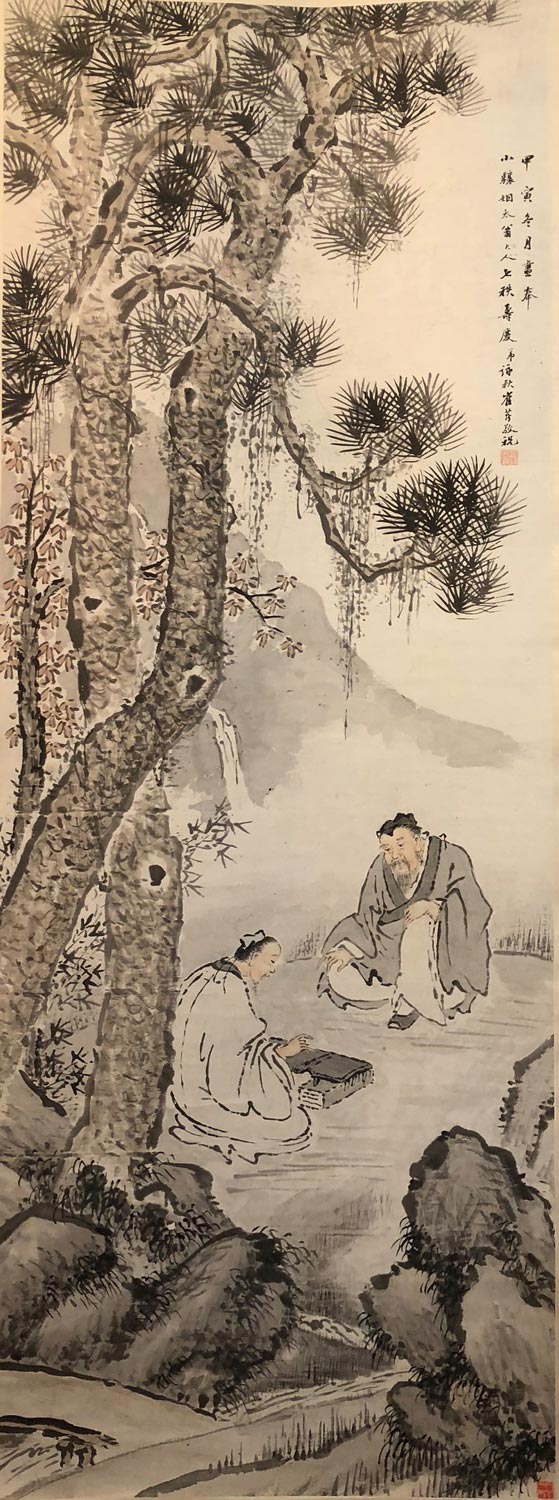|
T of C
Home |
My Work |
Hand- books |
Qin as Object |
Qin in Art |
Poetry / Song |
Hear, Watch |
Play Qin |
Analysis | History |
Ideo- logy |
Miscel- lanea |
More Info |
Personal | email me search me |
| Performance Themes My Performances My Repertoire | 首頁 |
|
Guqin and Friendship
1
|
古琴與友誼
Playing the qin for a friend 2 |
 Friendship here generally refers to friendship between the literati, whose government service often required them to spend years away from family and friends. The silk string qin is an intimate instrument; simply playing it in the right environment can be an intimate act - even more so when playing for a zhiyin (soulmate). And just as Chinese paintings often show friends getting together, this is also a recurring theme in guqin melodies
Friendship here generally refers to friendship between the literati, whose government service often required them to spend years away from family and friends. The silk string qin is an intimate instrument; simply playing it in the right environment can be an intimate act - even more so when playing for a zhiyin (soulmate). And just as Chinese paintings often show friends getting together, this is also a recurring theme in guqin melodies
Melodies related to this theme include:3
- In the Mountains Thinking of a Friend
(Shanzhong Si Youren; 1425)
An early melody unrelated to the modern Yi Guren - White Moon over the River
(Jiang Yue Bai; 1525)
The story of Boya playing and Ziqi understanding established the idea of "zhiyin": friends who deeply understand each other - High Mountains (Gao Shan; 1425)
When Boya played this melody, Ziqi could envision the soaring high mountains. - Flowing Streams (Liu Shui; 1425)
Paired with High Mountains - Boya Mourns Ziqi (Boya Diao Ziqi; 1425)
When his "zhiyin" dies, what use is it to play the qin any more? - Glue and Lacquer Intonation
(Jiao Qi Yin; 1525)
Friends are like glue and lacquer on a qin - Engaging with Old Friends
(Gu Jiao Xing; 1525)
In olden days friendships were very close - Thrice Parting for Yangguan
(Yangguan Sandie; >1505)
Long version of famous parting song with lyrics by Wang Wei (compare short version, 1530) - A Drunken Fisherman Sings in the Evening
(Zui Yu Chang Wan, 1525)
Two friends take a boat ride, hear a drunken fisherman singing - Dialogue between a Fisherman and a Woodcutter
(Yu Qiao Wenda, 1559)
Two friends discuss the meaning of life - Wine Mad (song version)
(Jiu Kuang, 1589)
Friends get together to drink
This program could be connected with one that concerns romantic friendships.4
Footnotes (Shorthand references are explained on a
separate page)
1.
Friendship and the Qin
See also Passions of the Literati.
(Return)
2.
對友彈琴 Playing the qin for a friend (compare 對牛彈琴
Playing the Qin for an Ox)
Regarding the condition of this rice paper scroll, along the paper on top of the upper scroll rod the name of the painting was given as 松樹促膝談 Songshu Cuxi Tan (Private Conversation by a Pine Tree). However, when this paper became torn right along the top edge of the hanging part of the scroll, reattaching the scroll required glueing the top of it to the upper scroll rod, thus covering up this writing.
To the upper right of the scroll itself is an inscription followed by a seal (see closeup). On the seal are the characters (zhuan style) "崔芹 Cuī Qín", the name of a quite well-known painter from Guangzhou, style name 詠秋 Yǒngqiū ("one who praises autumn"); he lived ca. 1841 - 1915. The inscription itself says,
Presented during a winter month of a jiayin" year (must be 1914).
小驤姻太翁 大人七秩壽慶 弟詠秋崔芹敬祝
Offered up to the father of my child's parents-in-law on his 70th birthday; presented as a gift by 'younger brother' Cui Qin, nicknamed Yongqiu.
(Regarding the date, in 1914 Cui Qin himself would have been over 70.)
This scene is quite a typical one except that the qin is resting on a pile of books. Although unusual (especially with the qin pegs resting directly on the top of the books instead of hanging over the edge), this could be a quite effective way of playing qin while seated on the ground, assuming there was something to the left holding up that end of the qin.
For another image showing qin together with books see
Qin and books.
(Return)
3.
Relevant melodies
This list could be expanded by adding melodies that touch on this theme more indirectly, for example, Evening Talk by a Guest's Window.
(Return)
4.
Romantic friendships
In addition to Passions of the Literati see also
Qin in Popular Culture as well as
Women and the Guqin.
(Return)
Return to the top or to the Guqin ToC